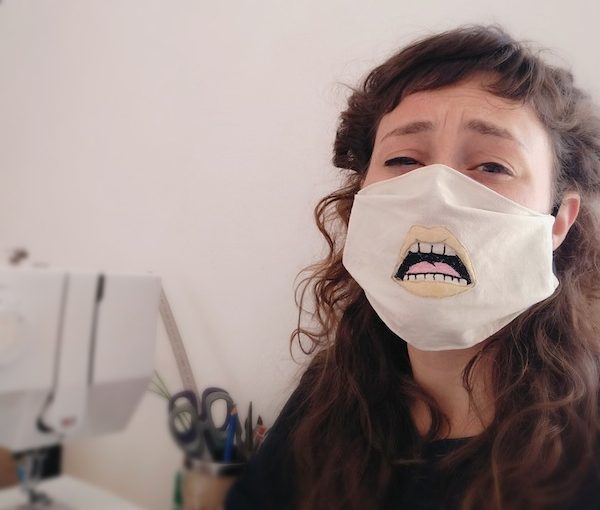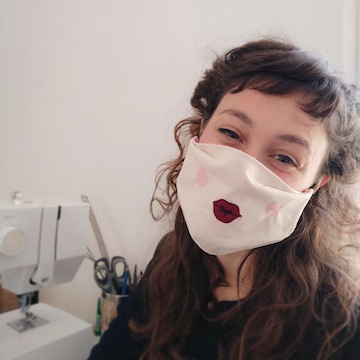Whew, we’re dealing with so much these days. The pandemic seemed all-consuming, until the serious weather events started. It’s a lot.
Lately, I’ve thought about a Jewish folk tale, often retold in children’s books. Usually, it’s a man who goes to his rabbi because his small house, full of relatives, is too loud. The rabbi suggests he brings his chickens inside. Then maybe a dog, or a cat, goats, a horse and a cow. Then, the man is beside himself with all the noise and mess! He goes back to the rabbi, who suggests he return those animals to the barnyard. Suddenly, his house seems big and quiet. The rabbi’s lesson, of course, is to be grateful for what we’ve got. We have to realize (over and over) that whatever we have, even if it’s small or loud, maybe wasn’t so bad in the first place. Through this sort of change and gratitude practice, we may come to realize that there are good aspects to many situations that perhaps previously seemed dire.
Last week, I felt so lucky. I managed to “score” my twins (age 10) COVID vaccine appointments in a medical clinic about two blocks from our home. We were absolutely thrilled. I’d gotten us on a list at this clinic just in case they should gain access to the pediatric vaccine. We were expecting and willing to wait awhile because we didn’t want to go to a supersite. To our surprise, the clinic got the vaccines in quickly. They called us at 11 in the morning, I picked the kids up from school early, a little after 1 p.m., and the vaccines were in their arms by 1:45.
I’d promised the twins gelati afterwards, but the windchill had been -30 that morning, and our neighbourhood gelato shop is not doing dine-in. Even Winnipeggers have their winter limits. We celebrated by eating pastries from a local bakery instead. Then we watched the Macy’s Thanksgiving Day Parade on the couch together. It was, coincidentally, American Thanksgiving. We had a lot to be thankful about.
All this luck evened out when, a couple days later, one of my twins developed what seemed like a full-blown head cold. We all went off to get tested because maybe we have new allergies, maybe it was a head cold or maybe it was COVID. The good news is that we all tested negative. Whew.
Bad news is that the kid still had a cold and he had to stay home from school with his twin while we waited for the test results. The good part is that, while at home, we had time to go through the kids’ bookshelf, removing all the easy readers and things we no longer needed. (It was then that I encountered multiple versions of that noisy house story I described above.)
I mention all this because, like me, you may be surrounded by those who are yearning for things to get better. Of course, this isn’t a bad hope. Sometimes, when things change, it’s seriously awful news, or it’s not a huge improvement in our lives. So, we maybe have to be grateful for what we’ve got, and learn to accept the change and work with it. It’s working with what’s in front of us, whether it’s climate change weather events or pandemic challenges.
I considered thoughts about change while doing my daily page of Talmud and studying the talmudic tractate of Taanit. In Taanit, on page 17, there’s a discussion about whether those who were high priests in the Temple can drink alcohol. In Rabbi Elliot Goldberg’s introduction from the My Jewish Learning website, he explains this situation. When the Temple stood in Jerusalem, the priests weren’t allowed to drink when they were on duty. Yet, when the rabbis are debating this in the Talmud, it’s been a long time, more than a century, since the Temple was standing. At first, their conclusion is that all priests must stand by, forever, completely sober. After all, they must be ready to be on duty, if the Temple should be rebuilt.
However, according to Rashi’s explanation, Rabbi Judah HaNasi’s decision becomes law. He says that, since it’s unlikely the Temple will be rebuilt any time soon, priests are allowed to drink alcohol every now and again. Rabbi Judah HaNasi is willing to accept that a big change has happened. He finds something good in a hard situation, which might bring somebody a little enjoyment.
Change happens, whether we like it or not. Maybe, like the loss of the Temple, or the destruction of homes due to climate change or people who die from the pandemic, it’s a horrible loss. There’s no denying some losses are life-changing.
Yet, there is also just change. At the beginning of the pandemic, I was working flat out to schedule my kids into a series of summer camps. In March 2020, I was desperate to find the next best experience. Long story short, in Manitoba, many camps were canceled in 2020. We had to learn a whole new way of keeping our kids busy all summer long. We were oddly prepared when, in summer 2021, our preliminary summer plans again hit a snag.
Oddly, for both me and my kids, those unstructured summer days were a gift. I would never have changed our lives that substantially if the pandemic hadn’t hit. Now, faced with twins at home for a day in December due to a head cold, I was happy to let them wile away the unexpected time. There was a lot of creative play. There were books to read and activities to do, the dog to feed and dinner to make. The day passed. My kids were upset at missing school but, like Judah HaNasi, we can try to find the bright side. Roughly 2,000 years ago, it meant high priests could have an alcoholic beverage if they wanted. It goes without saying that this doesn’t make up for the loss of the Temple, but it’s not a bad side benefit, either.
May the changes that come be easy to cope with and good ones for you. At the very least, let’s hope some of the changes have an unexpected benefit!
Joanne Seiff has written regularly for CBC Manitoba and various Jewish publications. She is the author of three books, including From the Outside In: Jewish Post Columns 2015-2016, a collection of essays available for digital download or as a paperback from Amazon. Check her out on Instagram @yrnspinner or at joanneseiff.blogspot.com.



